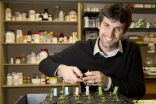(Press-News.org) (BOSTON) -- Gene drives are genetic elements - found naturally in the genomes of most of the world's organisms - that increase the chance of the gene they carry being passed on to all offspring, and thus, they can quickly spread through populations. Looking to these natural systems, researchers around the world, including some Wyss Institute scientists, are developing synthetic gene drives that could one day be leveraged by humans to purposefully alter the traits of wild populations of organisms to prevent disease transmission and eradicate invasive species.
These synthetic gene drives, designed using an RNA-guided gene editing system called CRISPR, could one day improve human health and the environment by preventing mosquitoes and ticks from spreading diseases such as malaria and Lyme; by promoting sustainable agriculture through control of crop pests without the use of toxic pesticides and herbicides; and by protecting at-risk ecosystems from the spread of destructive, invasive species such as rats or cane toads.
However, the development of RNA-guided gene drive technology calls for enhanced safety measures due to its nearly unique capability to affect shared ecosystems should organisms containing synthetic gene drives be accidentally or deliberately released from a laboratory. This potential risk is especially relevant to gene drive research in highly mobile species such as fruit flies or mosquitoes.
"One of the great successes of engineering is the development of safety features, such as the rounding of sharp corners on objects and the invention of airbags for cars, and in biological engineering we want to emulate the process of designing safety features in ways relevant to the technologies we develop," said Wyss Core Faculty member George Church, Ph.D., who leads the Synthetic Biology Platform at the Wyss Institute and is also the Robert Winthrop Professor of Genetics at Harvard Medical School and Professor of Health Sciences and Technology at Harvard and MIT.
At the Wyss Institute, enhanced protocols for safely and securely researching emerging biotechnologies, including RNA-guided gene drives, have already been formally implemented. The safeguards were put in place proactively, step-by-step, in direct parallel with the development of the first RNA-guided gene drives at the Wyss Institute. The working documents have been made publicly available by the Institute to encourage widespread adoption of multi-tier confinement and risk assessment procedures. Church was instrumental in the design of the enhanced biosafety and biosecurity protocols.
Now, research teams from the Wyss Institute and University of California, San Diego - the only two groups to have published work on RNA-guided CRISPR gene drives - have proactively assembled an international group of 26 experts, including prominent genetic engineers and fruit fly geneticists, to unanimously recommend a series of pre-emptive measures to safeguard gene drive research.
Led by Wyss Institute Technology Development Fellow, Kevin Esvelt, Ph.D., and UC San Diego Professor of Cell and Developmental Biology Ethan Bier, Ph.D, the 26 authors of this consensus recommendation, which is published online in Science Express journal and includes representatives from every major group known to be working on gene drives, calls for all researchers to use multiple confinement strategies in order to prevent the accidental alteration of wild populations. The group also provides explicit recommended guidelines for regulatory authorities evaluating proposed new work. Furthermore, the group hopes the consensus will launch broadly inclusive discussions concerning the need for transparency and public involvement in this nascent scientific field.
"Just as we demand informed consent in healthcare, people have the right to know about the development of gene drives or other technologies that could directly impact their lives," said Esvelt.
Motivated by concerns over intellectual primacy and property, scientists rarely disclose new research until it is published in peer-reviewed journals. Esvelt and others are hopeful that the field of gene drive research is so nascent that it may be possible to build a community of scientists that share their research with the public throughout the development process.
"This would promote collaboration and avoid needless duplication of efforts among different research groups while allowing diverse voices to help guide the development of a technology that could improve our shared world," said Esvelt. "And eventually, it might inspire a similar shift towards full transparency in other scientific fields of collective public importance."
"The scientific community has a responsibility to the public and to the environment to constantly assess how new biotechnologies could potentially impact our world," said Wyss Institute Founding Director Donald E. Ingber, M.D., Ph.D. "This proactive consensus recommendation - reached in an extraordinary demonstration of the power of scientific collaboration over competition - provides concrete, useful guidelines for safeguarding our shared ecosystem while ensuring that remarkable breakthroughs, such as synthetic gene drives, can be applied to their full potential for the greater good."
INFORMATION:
The Wyss Institute for Biologically Inspired Engineering at Harvard University (http://wyss.harvard.edu) uses Nature's design principles to develop bioinspired materials and devices that will transform medicine and create a more sustainable world. Wyss researchers are developing innovative new engineering solutions for healthcare, energy, architecture, robotics, and manufacturing that are translated into commercial products and therapies through collaborations with clinical investigators, corporate alliances, and formation of new start-ups. The Wyss Institute creates transformative technological breakthroughs by engaging in high risk research, and crosses disciplinary and institutional barriers, working as an alliance that includes Harvard's Schools of Medicine, Engineering, Arts & Sciences and Design, and in partnership with Beth Israel Deaconess Medical Center, Brigham and Women's Hospital, Boston Children's Hospital, Dana-Farber Cancer Institute, Massachusetts General Hospital, the University of Massachusetts Medical School, Spaulding Rehabilitation Hospital, Boston University, Tufts University, and Charité - Universitätsmedizin Berlin, University of Zurich and Massachusetts Institute of Technology.
Numerous genes that regulate the activity of a neurotransmitter in the brain have been found to be abundant in brain tissue of depressed females. This could be an underlying cause of the higher incidence of suicide among women, according to research at the University of Illinois at Chicago.
Studying postmortem tissue from brains of psychiatric patients, Monsheel Sodhi, assistant professor of pharmacy practice at UIC, noted that female patients with depression had abnormally high expression levels of many genes that regulate the glutamate system, which is widely distributed ...
Washington, DC - July 30, 2015 - In research that could lead to protective probiotics to fight the "chytrid" fungus that has been decimating amphibian populations worldwide, Jenifer Walke, PhD, a postdoctoral researcher at Virginia Tech University, Blacksburg, and her collaborators have grown bacterial species from the skin microbiome of four species of amphibians. The research appears July 10 in Applied and Environmental Microbiology, a journal of the American Society for Microbiology.
In the study, the investigators swabbed the four species, all of which inhabit Virginia. ...
PHILADELPHIA -- The importance of a diet rich in fish oils - now a billion dollar food-supplement industry -- has been debated for over half a century. A few large clinical trials have supported the idea that fish oils confer therapeutic benefits to patients with cardiovascular disease. Researchers think that hearts and blood vessels may benefit in part from their anti-inflammatory properties.
Synthetic versions of marine fish lipid-derived molecules called specialized pro-resolving mediators (SPMs) show anti-inflammatory properties in cell cultures and live animal models. ...
Not every mom and dad agree on how their offspring should behave. But in genetics as in life, parenting is about knowing when your voice needs to be heard, and the best ways of doing so. Typically, compromise reigns, and one copy of each gene is inherited from each parent so that the two contribute equally to the traits who make us who we are. Occasionally, a mechanism called genomic imprinting, first described 30 years ago, allows just one parent to be heard by completely silencing the other.
Now, researchers at the University of Utah School of Medicine report on a ...
If the technical features of a new camera delight the tech experts but leave consumers scratching their heads, how should a retailer's website present those views and what sales results could it expect?
A paper to be published in the September issue of the Journal of Retailing provides insights on the relatively new phenomenon of online user reviews.
In "User Reviews Variance, Critic Reviews Variance, and Product Sales: An Exploration of Customer Breadth and Depth Effects," Feng Wang of Hunan University, Xuefeng Liu of Loyola University Maryland, and Eric Fang of ...
A national coalition of experts that includes two University of Washington researchers has a bold plan to reduce behavioral health problems such as violence and depression among young people across the country by 20 percent in a decade.
And their proposal rests on one simple principle: prevention.
The group's paper, recently published on the National Academy of Medicine website, recommends implementing evidence-based prevention programs on a national scale to reduce a host of problems ranging from drinking to delinquent behavior, anxiety and risky driving. It notes ...
Many physicians are pushing back against or debating new requirements for maintaining medical board certifications, which affect more than 250,000 physicians nationwide. Now, a new study by UC San Francisco and Stanford University researchers concludes that the cost of implementing the most recent requirements will be an estimated $5.7 billion over the next 10 years.
In their study, published online on July 27, 2015, in the Annals of Internal Medicine, the researchers found that most costs of the latest maintenance-of-certification (MOC) requirements implemented for ...
Athens, Ga. - An international team of researchers led by scientists at the University of Georgia has discovered how parasitic plants, which steal their nutrients from another living plant, evolved the ability to detect and attack their hosts. Their findings, published recently in the journal Science, could lead to new techniques to control the thieving weeds.
There are thousands of parasitic plant species, but the most burdensome for humans are those that infiltrate farmland and destroy crops. Parasite infestations reduce crop yields by billions of dollars each year, ...
In cells with latent HIV infection, the virus is dormant, and such cells are therefore not attacked by the immune system or by standard antiretroviral therapy. To eradicate the virus from the human body and truly cure a patient, reservoirs of latently infected cells need to be activated and eliminated "the so-called "kick-and-kill" approach. Two studies published on July 30th in PLOS Pathogens report encouraging results on the use of a combination of several drugs to efficiently reactivate HIV in cells with latent infection.
Please contact plospathogens@plos.org if you ...
A deadly fungus identified in 2013 could devastate native salamander populations in North America unless U.S. officials make an immediate effort to halt salamander importation, according to an urgent new report published today in the journal Science.
San Francisco State University biologist Vance Vredenburg, his graduate student Tiffany Yap and their colleagues at the University of California, Berkeley and the University of California, Los Angeles say the southeastern United States (particularly the southern extent of the Appalachian Mountain range and its southern neighboring ...


